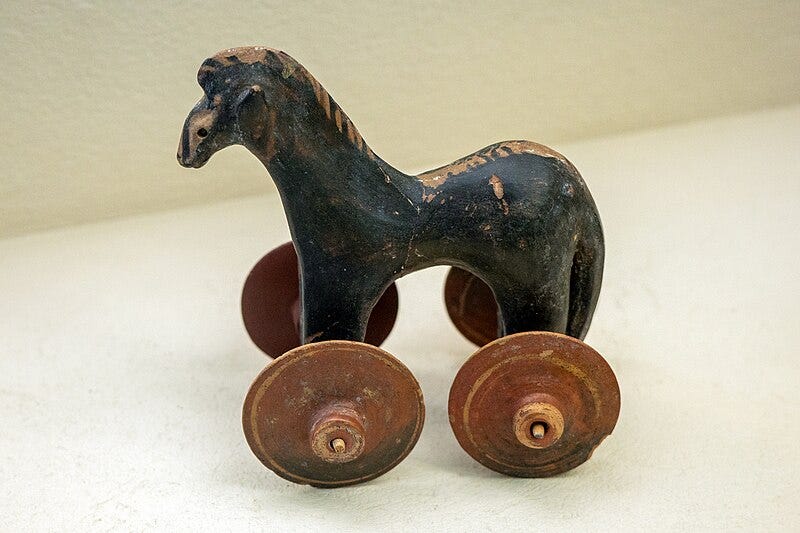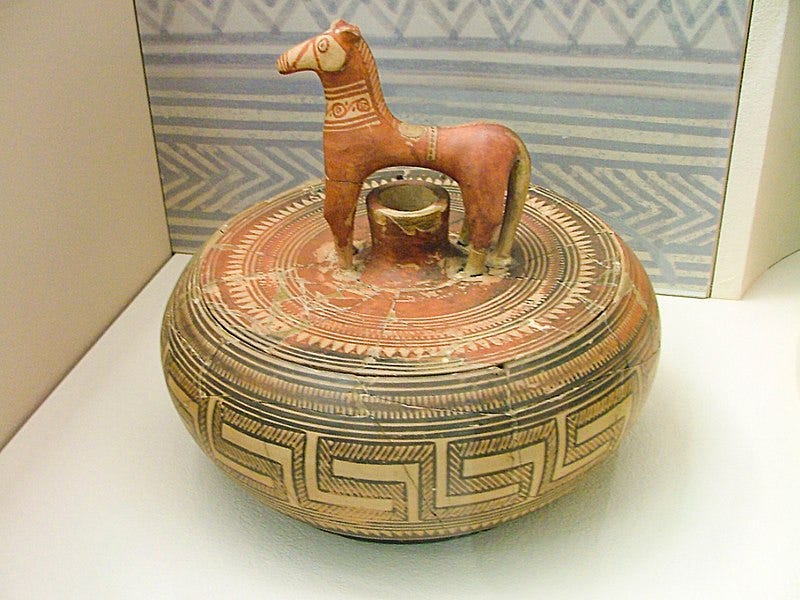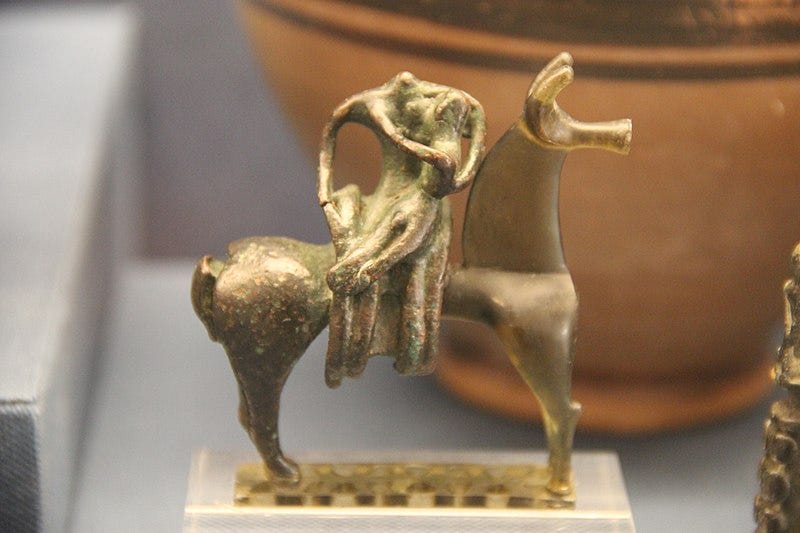This post is a continuation of my substack on the Iliad. All proceeds from the substack are donated to classics adjacent non-profits on a monthly basis. Last year this substack provided over $2k in charitable donations.
Book 8 of the Iliad can seem a bit oddly placed in the epic’s first half—it doesn’t hearken back to earlier moments in the war as books 1, 2, 3, and 7 do; instead, it provides an intense battle scene that helps to set the scene for the Achaean panic that motivates the embassy to Achilles in book 9. Structurally, it is similar to book 4 which starts with a speech by Zeus forbidding the gods from engaging in the war; but it also echoes book 1, in that it ends with another speech where Zeus anticipates the plot of the epic (laying out the general actions of books 9-16, in particular the death of Achilles.
The book’s action hangs on Zeus’ intervention—his tipping of the scales in favor of the Trojans, his thunder to frighten the Greeks, and an omen near the middle to provide different messages to each side. But a central theme of the book must be the characterization of Hektor. Books 6, 7 and 8 feature Hektor prominently: he is a son, brother, and father/husband returning to Troy in book 6; a warrior standing up for one-on-one combat in book 7; and a military leader in book 8.
Structure of Iliad 8
1-80 Divine Council: Zeus tells the gods to stay out of the battle and retreats to watch, tips the scales for the Trojans
50-245 Nestor gets trapped and Diomedes rescues him from Hektor; Hera rouses Agamemnon to stop Hektor from burning the ships
245-490 Zeus feels bad and allows the Greeks to push back; Hektor wounds Teucer; Hera and Athena talk about opposing Zeus’ will; Zeus tells Iris to tell them to stop and then lays out the plot of the Iliad through Patroklos’ death
490-565 Hektor assembles the Trojans and has them camp outside the city
Hektor’s decision to stay outside of the city and keep the pressure on the Greeks is all part of “Zeus’ plan”, in a way. But as with every major Iliadic action the motivation is not left to Zeus alone. Instead, we see Hektor making key decisions and rallying his troops in vain hope of victory and glory. The image we find of Hektor is polysemous, shifting on the audience. To the internal audiences (some of the gods and the Greeks), he has finally become the ‘man-slaying’ Hektor we are told they fear, despite his near loss to Ajax in book 7. For Zeus, he is an instrument of his plan to have the Greeks suffer for dishonoring Achilles. As an external audience, we know Hektor is doomed to fail and we know that the fears of the Greeks and the other gods about the Achaeans’ losing are (somewhat) unfounded (‘somewhat’ because myriads still die!). And yet, we are also treated to a more complicated hero than we might think.

When I try to imagine how ancient audiences responded to the characterization of heroes in the epic we have, I consider two kinds of performance axes: on one, we have the episodic performances of epic, focusing on popular scenes; on the other, we have a major performance of a song like our own, that pieces together a different type of character in a sustained treatment that strings together ‘traditional’ and ‘non-traditional’ scenes (if the latter is possible). The significance here is that meaning in storytelling is developed through contrast and context, just as in language. The tension—or collaboration—between axes I just mentioned could also be reframed as the alternation between diachronic and synchronic aspects of language. In any given utterance, our meaning (intended or otherwise) relies on prior use and prior experience of a lexical item or morpheme, but the immediate meanings build on the combinations. The diachronic axis informs the synchronic, but the performance in the moment is realized differentially based on the experience (and competence) of performer and audience.
When it comes to a traditional figure like Hektor, I think we need to credit the tension between conventional/formulaic elements (‘man-slaying’ Hektor) and the unfolding narrative of this particular poem. Hektor up to this point in book 8 has not been the most fearsome warrior in the epic (if anything, that title belongs to Diomedes and then Ajax). He has been a chiding brother, a retreating son, and a father struggling to balance the necessity of war and the inevitability of death against his role a leader of a besieged city’s armies.
Some of the tension in these roles emerges in two rallying speeches in the first third of book 8. First, Hektor addresses the combined forces of Troy and their allies:
Iliad 8.172-183
“Hektor was calling out to the Trojans, roaring:
Trojans and Lykians and Spear-fighting Dardanians
Be men, friends, and remembering your rushing valor.
I know that Zeus assented to me willingly
To have victory and great glory, to be a pain for the Danaans.
The fools who thought up these walls here,
Useless and worth nothing. They will not withstand my fury.
My horses will easily leap over this hand-dug trench,
But when I make it to the hollow ships,
Don’t forget the destructive fire at that time
So that I can set the ships alight and kill them,
The Argives, thunderstruck beneath the smoke by their ships.”῞Εκτωρ δὲ Τρώεσσιν ἐκέκλετο μακρὸν ἀΰσας·
Τρῶες καὶ Λύκιοι καὶ Δάρδανοι ἀγχιμαχηταὶ
ἀνέρες ἔστε φίλοι, μνήσασθε δὲ θούριδος ἀλκῆς.
γιγνώσκω δ’ ὅτι μοι πρόφρων κατένευσε Κρονίων
νίκην καὶ μέγα κῦδος, ἀτὰρ Δαναοῖσί γε πῆμα·
νήπιοι οἳ ἄρα δὴ τάδε τείχεα μηχανόωντο
ἀβλήχρ’ οὐδενόσωρα· τὰ δ’ οὐ μένος ἁμὸν ἐρύξει·
ἵπποι δὲ ῥέα τάφρον ὑπερθορέονται ὀρυκτήν.
ἀλλ’ ὅτε κεν δὴ νηυσὶν ἔπι γλαφυρῇσι γένωμαι,
μνημοσύνη τις ἔπειτα πυρὸς δηΐοιο γενέσθω,
ὡς πυρὶ νῆας ἐνιπρήσω, κτείνω δὲ καὶ αὐτοὺς
᾿Αργείους παρὰ νηυσὶν ἀτυζομένους ὑπὸ καπνοῦ.
Almost immediately after this speech, he talks to his horses.
8. 184-197
“So he spoke and then he was calling out and addressing his horses:
Xanthus and Podargos, Aithôn, and glorious Lampos
Now is the time to pay me back for your food, the great heaps
Of it Andromache, the daughter of great-hearted Eetion
Set out for you foremost, the thought-sweetening grain
And the wine she mixed in for you to drink, whenever the heart compelled,
Before even me, I who claim to be her powerful husband.
Rush forward now and hurry so that we can grab
Nestor’s shield, the fame of which rises to heaven,
Because it is all gold and has straps made the same way
And the fine-worked breastplate of horse-taming Diomedes
The one Hephaestus wore himself out when he made it.
If we can take those two things, I think that the Achaeans
Will climb into their swift ships this very evening.”῝Ως εἰπὼν ἵπποισιν ἐκέκλετο φώνησέν τε·
Ξάνθέ τε καὶ σὺ Πόδαργε καὶ Αἴθων Λάμπέ τε δῖε
νῦν μοι τὴν κομιδὴν ἀποτίνετον, ἣν μάλα πολλὴν
᾿Ανδρομάχη θυγάτηρ μεγαλήτορος ᾿Ηετίωνος
ὑμῖν πὰρ προτέροισι μελίφρονα πυρὸν ἔθηκεν
οἶνόν τ’ ἐγκεράσασα πιεῖν, ὅτε θυμὸς ἀνώγοι,
ἢ ἐμοί, ὅς πέρ οἱ θαλερὸς πόσις εὔχομαι εἶναι.
ἀλλ’ ἐφομαρτεῖτον καὶ σπεύδετον ὄφρα λάβωμεν
ἀσπίδα Νεστορέην, τῆς νῦν κλέος οὐρανὸν ἵκει
πᾶσαν χρυσείην ἔμεναι, κανόνας τε καὶ αὐτήν,
αὐτὰρ ἀπ’ ὤμοιιν Διομήδεος ἱπποδάμοιο
δαιδάλεον θώρηκα, τὸν ῞Ηφαιστος κάμε τεύχων.
εἰ τούτω κε λάβοιμεν, ἐελποίμην κεν ᾿Αχαιοὺς
αὐτονυχὶ νηῶν ἐπιβησέμεν ὠκειάων.
Where, we might expect Hektor to enter battle immediately or exhort a particular hero, instead, Troy’s champion turns to his horses Hektor and orders to pay him back for their care by helping him seize Nestor’s shield, an object endowed with kleos by its quality and owner, and Diomedes’ breastplate. This speech is marked as exhortative by these commands and the accompanying appeal to a reciprocal relationship. It is safe to say that Hektor anthropomorphizes the horses—Andromache mixes wine to make the wheat-meal sweet. Typically, when a superior invokes prior meals as motivation for action the vertical relationship is direct—here, however, Hektor reveals that Andromache feeds the horses.
The invocation of reciprocity, however, is one-degree removed—run fast, he says, pay me back for the care Andromache gave you. In this passage we find themes typically associated with Hektor throughout the epic—he invokes kleos, reveals an optimistic, if not tragically mistaken, attitude towards the war, and defines himself in terms of his family. In this passage, Andromache functions as a metonym for the Trojan city. It matters not if she actually feeds Hektor’s chariot team—Andromache represents the nurturing and nourishing figure who cannot fight, the women and children of Troy, in short, the city itself.
As Hektor initiates his offensive strategy, the characterization of his hopes and delusion is stable—kleos is there for the taking; the Achaeans can be repelled; the city can be saved. The final lines depict Hektor’s battle-rush—winning the armor is metonymic language for killing Diomedes and Nestor, which surely would be a blow to Achaian morale, but this assertion is contained within a future-less vivid conditional statement (lines 196-7). Hektor’s speeches in the Iliad contain many impossible conditionals, reflecting the gap between the world Hektor desires and the one he finds. Note as well, the contrast between his boast about burning the ships to his assembled allies and his more modest wish to his horses for the Achaeans to sail home.

The position of this speech may add to its irony. In this sequence of speeches, Hektor insults the Achaeans, rallies his army and turns to exhort his own horses. Zeus’ intervention is accompanied by one of Hektor’s most awkward experiments in leadership. He uses the language of martial exhortation on creatures that not only cannot speak to him in return but whom the narrative does not allow to react. For comparison, consider Hektor’s speech to his allies in book 17
Iliad 17.219-233
Rallying, he addressed them with winged words:
“Hear me, you thousand tribes of neighboring allies.
For I did not gather each of you here from your cities
searching for a multitude or needing one,
but so that you might willingly protect the wives and innocent children
of the Trojans for me from the war-mongering Achaeans.
Considering these things, I have exhausted the host
with gifts and food, and I increase the spirit of each of you.
So, let everyone turn straightaway and either be killed
or be saved—for this is the seduction of war.
Whoever then now conveys Patroklos, even dead
to the horse taming Trojans and to whomever Ajax yields
I will split half the booty with him, and I will have
the other half and his kleos will be half of mine.”τοὺς ὅ γ’ ἐποτρύνων ἔπεα πτερόεντα προσηύδα·
κέκλυτε μυρία φῦλα περικτιόνων ἐπικούρων·
οὐ γὰρ ἐγὼ πληθὺν διζήμενος οὐδὲ χατίζων
ἐνθάδ’ ἀφ’ ὑμετέρων πολίων ἤγειρα ἕκαστον,
ἀλλ’ ἵνα μοι Τρώων ἀλόχους καὶ νήπια τέκνα
προφρονέως ῥύοισθε φιλοπτολέμων ὑπ’ ᾿Αχαιῶν.
τὰ φρονέων δώροισι κατατρύχω καὶ ἐδωδῇ
λαούς, ὑμέτερον δὲ ἑκάστου θυμὸν ἀέξω.
τώ τις νῦν ἰθὺς τετραμμένος ἢ ἀπολέσθω
ἠὲ σαωθήτω· ἣ γὰρ πολέμου ὀαριστύς.
ὃς δέ κε Πάτροκλον καὶ τεθνηῶτά περ ἔμπης
Τρῶας ἐς ἱπποδάμους ἐρύσῃ, εἴξῃ δέ οἱ Αἴας,
ἥμισυ τῷ ἐνάρων ἀποδάσσομαι, ἥμισυ δ’ αὐτὸς
ἕξω ἐγώ· τὸ δέ οἱ κλέος ἔσσεται ὅσσον ἐμοί περ.
There is overlap across his exhortative speeches, but the contrast is telling as well: Hektor speaks to his horses as if to a close companion, a brother or a comrade in arms. His rallying speeches contain some of the same themes, but lack some of the intimacy of his address to his horses. There is a pathos because the expected exhortation here would be to one of his men, as Agamemnon speaks to Odysseus or Diomedes in book 4. Hektor’s speech to his horses may be said to emphasize his isolation.
There are three moments in the Iliad when heroes talk to horses. In their, Homer: The Resonance of Epic, Barbara Graziosi and Johannes Haubold describe Homeric heroes, especially Achilles, as occupying a midpoint between men and the gods. In a section entitled “God, Animals, and Fate,” they nicely describe the function of many animals in communicating divine will to mortal man through omens I would argue that horses potentially represent a midpoint between animals and men. In this scheme, Achilles’ conversation with Xanthus later in the epic (book 19) represents a mantic moment; Antilochus threatens his horses with starvation and abuse if they don’t win him the chariot race in book 23 (23.402-17). Achilles’ conversation with horses brings his his closeness to the gods into relief with his mortality; Antilochus’ youthful brashness towards his horses anticipates the conflicts that ensue at the end of the chariot race.
Hektor’s equine moment show the contrast between his public bluster and his more personal hope: he claims to all that they may win the war that day, but he asks his horses only to win some prize of renown. The stepped down ambitions of this close encounter echo his conversation with Andromache, the very present absence for Hektor’s speeches through the rest of the poem. But here, as when Hektor speaks to his own heart in book 22, he addresses an interlocutor who can or will not respond. Each of these scenes says far more about Just as Homeric figures may look above to see what they are not, we may imagine them looking down and discovering certain aspects of what they are.

Other posts on Iliad 8:
Iliad 8
Tyranny and the Plot: Introducing Iliad 8: Zeus’ control over the plot of the poem; performance divisions for the epic
Wishing the Impossible: Hektor in Iliad 8: Hektor’s character in the Iliad (part 1)
Stranded in Iliad 8 with Nestor and Diomedes: On Reading the Iliad and Neoanalysis: Neoanalysis and other models for reading the Iliad




Love what you say about horses occupying a middle ground between the human and animal...
Isn't this also the book in which Hector loses TWO of his charioteers?
I ask myself why such repetitions as losing two charioteers in one book happen in Homer (another example: the duels) and the answer I give is that repetitions happen in actual life and make the narrative more realistic . You can imagine Hector sitting around a fire telling his friends about the day he lost two charioteers -- but it isn't meaningful.
What leapt out to me about this book were the mentions of gold, lightning and fire -- which could all be seen as slightly related. Everything of Zeus's is gold; Zeus sends the lightning; the lightning makes fire... I think Book 8 is where the mentions of fire, not only in the action of the narrative but in the similes, start to get thick. We see many more references to fire after this book.
Interesting that you associate getting Nestor's shield with kleos: that shield being referred to as being made out of gold. So maybe kleos fits also in that chain of meanings-- gold, lightning, fire, fame.
Not sure if it's in this book but the ring that holds Hector's speer point to his speer shaft is also called golden.